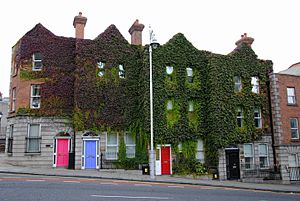Thomas Dongan (judge) facts for kids
Thomas Dongan (born around 1590, died 1663) was an Irish judge in the 1600s. He faced challenges in his career because people accused him of being a Roman Catholic (which was against the law for public officials at the time) and of not being loyal to the English Crown. He is best known as the father of Margaret Dongan. Margaret married a Dutch scholar named Arnold Boate, who wrote kindly about her and her father in his book, The Character of a Truly Virtuous and Pious Woman.
Contents
Early Life and Family Connections
Thomas Dongan was the fourth and youngest son of John Dongan of Castletown, County Kildare. His father, who passed away in 1592, worked for the Irish government as the second Remembrancer of the Exchequer of Ireland. Thomas's mother was Margaret Forster, whose father, Walter Forster, was a wine merchant in Winetavern Street, Dublin.
Both of Thomas's parents died when he was very young. He and his brothers were then raised by relatives. His oldest brother, Sir Walter Dongan (1579–1626), was the first to be given the title of Dongan Baronet. This family line later led to the Earls of Limerick. Thomas's father, John Dongan, was a wealthy man who left Thomas a lot of land, mostly in County Kildare.
Starting a Career in Law
In 1615, Thomas Dongan began studying law at Lincoln's Inn in England. However, he was expelled because he was a Roman Catholic, which was called "recusancy" at the time. Even though he likely remained Catholic his whole life, he publicly joined the Church of England by 1627. This allowed him to return to Lincoln's Inn and become a lawyer in England.
One of his important clients was the Lord High Treasurer, Lionel Cranfield, 1st Earl of Middlesex. Thomas married an English woman named Grace Palmer from Nottinghamshire and worked as a lawyer in England for several years. He later moved back to Ireland. In 1640, he joined the King's Inn and became a lawyer in Ireland. He lived near Castletown, in a house his father had left him.
Challenges During the Civil War
Thomas Dongan had built up a lot of wealth, adding to the land he inherited. However, he lost almost all his property and money during the Irish Rebellion of 1641. He found a powerful supporter in James Butler, 1st Duke of Ormonde. Ormonde sent Dongan to the English Court, recommending him as a loyal person.
Because of this, Dongan was made a judge of the Court of King's Bench (Ireland) in 1644. By 1648, when the King's supporters (Royalists) had been defeated in Ireland, Dongan was said to be the only High Court judge still working in Dublin. He was also in financial trouble. This might explain why he decided to work for the new government led by Oliver Cromwell, even though it hurt his reputation.
Dongan served as a High Court judge in parts of Ireland like Leinster and Ulster. He also sat on the High Court of Justice that tried and sentenced Sir Felim O'Neill and other rebels for treason in 1652-1653. However, he didn't gain much lasting benefit from supporting Cromwell's government. They were suspicious of him because he was Anglo-Irish and had many Catholic relatives. He was not given a permanent judge position in 1655. By 1659, he was so poor that the King's Inn let him live in his room there for free and didn't make him pay fees.
Family Life and Loyalty
Thomas Dongan's family life had its sad moments. His oldest son, William, was killed in 1645 during a battle in Leicester. His first wife, Grace, passed away soon after. He married again but lost his second wife in 1653. His daughter Margaret died in 1651, and her husband, Arnold Boate, died in 1653. He might have even married a third time.
Thomas Dongan was very loyal to his family. During the short time he had influence under Oliver Cromwell's rule, he used his position to help his relatives who supported the King. These relatives were in danger of losing their lands. He especially protected Mary Talbot, Lady Dongan, who was the widow of his nephew Sir John Dongan. With Thomas's help, this part of the family was able to keep much of their property. Two of her children later became Earls of Limerick.
Later Years and Legacy
After King Charles II returned to the throne (this was called the Restoration of Charles II), Dongan was living in extreme poverty. He asked to be made a judge again, even though he was old, sick, had Catholic sympathies, and his loyalty had been questioned. It's likely that Ormonde, who was about to become the Lord Lieutenant of Ireland, remembered his friend and recommended him. Dongan was then appointed as the third Baron of the Court of Exchequer (Ireland).
By 1663, he was asking to retire because of his age and poor health. He died in late June of that year. He was survived by his youngest son and heir, John, and his granddaughter, Mariana Boate.
While some historical accounts describe Dongan in a less positive way, his son-in-law Arnold Boate wrote about him with kindness and respect, highlighting his good family qualities. Even though he worked for Cromwell, which led to accusations of disloyalty to the King, it's important to remember that he used his position to help his family members who were in trouble.
Images for kids
 | Sharif Bey |
 | Hale Woodruff |
 | Richmond Barthé |
 | Purvis Young |



